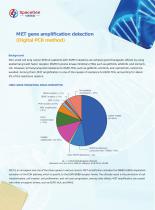
Catalog excerpts

MET gene amplification detection (Digital PCR method) Background Non-small cell lung cancer (NSCLC) patients with EGFR mutations can achieve good therapeutic effects by using epidermal growth factor receptor (EGFR) tyrosine kinase inhibitors (TKIs) such as gefitinib, erlotinib, and osimertinib. However, primary/acquired resistance to EGFR-TKIs, such as gefitinib, erlotinib, and osimertinib, cannot be avoided. Among them, MET amplification is one of the causes of resistance to EGFR-TKIs, accounting for about 5% of the resistance reasons. HER2 GENE TARGETING DRUG HERCEPTIN 第一/二代EGFR-TKI获得性耐药的生物学机制 Westover D et al. Ann Oncol. 2018 Jan 1;29(suppl_1):i10-i19. doi: 10.1093 MET is an oncogene and one of the driver genes in various cancers. MET amplification activates the ERBB3 (HER3)-dependent activation of the PI3K pathway, which is specific to the EGFR/ERBB receptor family. The ultimate result is the promotion of cell transformation, cell invasion, cell proliferation, and cell cycle progression, among other effects. MET amplification can coexist with other oncogenic drivers, s
Open the catalog to page 1
PRODUCT INFORMATION Product Name Pack Size Instruments Validated Sample Type MET gene amplification detection Tumor tissue DETECTION SIGNIFICANCE Before initiating treatment for NSCLC patients, detecting MET amplification helps match patients with appropriate targeted drugs based on genetic mutation information. This improves the specificity and effectiveness of treatment, ultimately achieving personalized therapy. FEATURES & ADVANTAGES High sensitivity: Can detect mutations with DNA sample content as low as 0.1%. Accurate quantification: Quantitatively detects gene copy number variations,...
Open the catalog to page 2






























